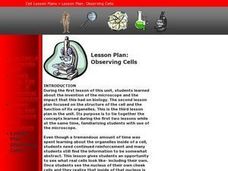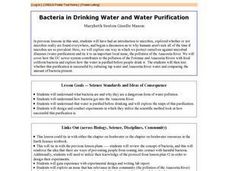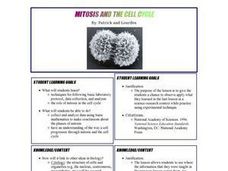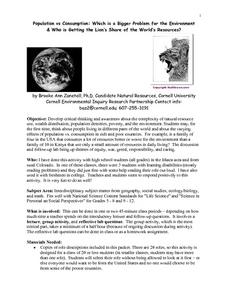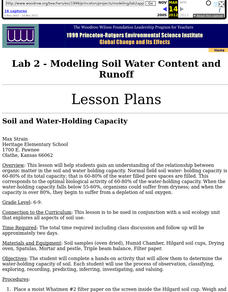Curated OER
Teaching About the Properties of Water
Students use video, Internet research, graphs and tables, worksheets and hands-on experiments to investigate the properties of water in a lake environment. They work under direction or through an inquiry process.
Curated OER
On the Microbe Trail: Bacteria and Aseptic Technique
Students pour, label, streak, seal and store plates in an incubator. They identify areas in their environment that provide a rich fauna of microbes once they have been swabbed. They identify areas of contamination through a laboratory...
Curated OER
An Introduction to Microbes and Microbes Are Everywhere
Seventh graders define the term microbe. They identify the five main groups of microbes. Students give examples of ways in which microbes have impacted or currently impact human life. They create a hypotheses for where they expect to...
Curated OER
Bacteria in Drinking Water And Water Purification
Students explore how sewer systems can contribute to water pollution and perform an experiment to see how well a water purification technique can protect against water-born microbial illnesses. They compare the bacterial growth from...
Curated OER
Mitosis And the Cell Cycle
Students determine the approximate time a cell spends in each phase of mitosis by counting cells in each phase from a prepared slide. They use a few simple calculations to estimate how long cells spend in each cycle in the body.
Curated OER
Insects Are Helpful!
Students see that insects do lots good and are very valuable to humans and nature. This is part of an ongoing effort to dispel fears of insects. They rotate through a series of centers that have examples of how insects contribute to our...
Curated OER
Tobacco and Organisms
Students work in teams to design and carry out experiments which show the effects of tobacco / nicotine on organisms. They write reports which are submitted to "The Company" and prepare oral reports which are presented to the class.
Curated OER
Population Vs Consumption: Which is a Bigger Problem for the Environment & Who is Getting the Lion's Share of the World's Resources?
Students develop critical thinking and awareness about the complexity of natural resource use, wealth distribution, population densities, poverty, and the environment. They think about people living in different parts of the world and...
Curated OER
Family Pedigrees
Students work as a class to first construct a pedigree of a popular singer, showcasing the singing gene being passed down through the generations. Students then make their own family pedigree and follow two traits through their family...
Curated OER
Permeability of Earth Materials
Students observe and classify the permeability of a variety of materials.
Curated OER
Wait, They Can do it by Themselves?
Students recognize the concepts of evolution and natural selection as well as cladistics and phylogenetics. They observe the process of regeneration in a sea anemone to simulate asexual reproduction.
Curated OER
Invertebrate Research Project
Students keep a scientific research notebook on an invertebrate detailing its behavior and responses.
Curated OER
Who's Who and How Do You Know for Sure?
Learners investigate the applications of DNA fingerprinting, They read crime scenarios and using the details of the crime and laboratory experimentation decide the suspects guilt or innocence.
Curated OER
Inquiry-based Investigations into Pond Water Microorganisms
Students become familiar with common microorganisms and experience exploring the microbial world.
Curated OER
Hominoid Skull Comparison
Students are provided with evidence used to support evolutionary theory. They are introduced to classification by using primates as an example. Students read article related to Hominoid Skull Comparison and write a summary about the...
Curated OER
Ground Level Ozone
High schoolers analyze real-time data and predict the level of ground ozone in their home city. They measure the level of ground ozone, submit their data to an online collaborative project, and create a web page presenting the dangers of...
Curated OER
Organs to Go...
Students explain the principles of experimental design and reinforce the steps of the scientific method. Each group of students create a "slush" type mixture to store a chicken liver.
Curated OER
Remote Control
Students explore and evaluate several distance learning Web sites. They defend whether or not they would like to participate in the distance learning experience by either writing a proposal for including this distance learning project...
Curated OER
The Breathtaking Nature of the Urban Explosion, Part 4
Students explore the respiratory system. They use a computer to monitor the respiratory rate of an individual. They determine residual oxygen levels in exhaled air. Students evaluate how internal 02 and C02 concentrations influence...
Curated OER
Website Scavenger Hunt
Young scholars use the internet to complete a species scavenger hunt. In groups, they answer questions given to them about sea lions, rockfish and killer whales. As a class, they identify any questions they have and discuss the role...
Curated OER
Field Of Beans
Pupils investigate the concept of crop farming. They plant small fields to test different theories of agriculture. Students keep care over the fields, including pest and weed control. Pupils make and record daily observations to measure...



